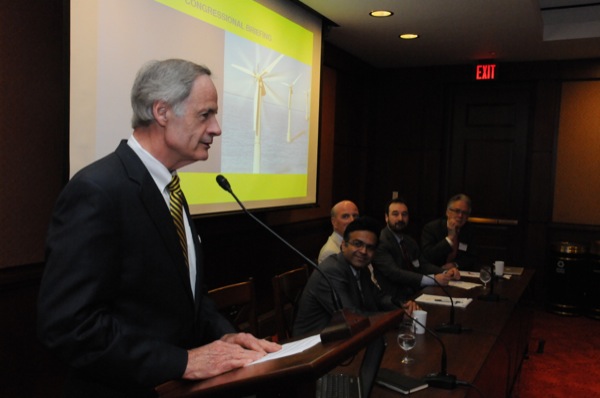
Offshore wind energy
Special Initiative for Offshore Wind convenes industry, government in D.C.
5:42 p.m., June 16, 2014--In Europe, offshore wind turbines support 58,000 jobs and generate enough electricity to power 6 million homes. Experts from the offshore wind industry gathered at the Capitol Thursday, June 12, to share lessons learned that could help produce similar results stateside.
Organized by the University of Delaware’s Special Initiative on Offshore Wind, which fosters collaboration among offshore wind energy industry, policy makers, non-government organizations and academics, the symposium focused on reducing costs and creating jobs.
Campus Stories
From graduates, faculty
Doctoral hooding
U.S. Sen. Tom Carper sponsored the event, voicing support for extending the renewable energy tax credits currently under consideration by Congress and for creating offshore wind farms along America’s coasts.
“There’s a lot of potential out there, and we need to tap that potential,” Carper said.
While several offshore wind projects are underway in the United States, none have started construction yet. Efforts in waters off Massachusetts and New Jersey are furthest along in the approval and financing process.
Panelists at Thursday’s symposium included representatives from Alstom Power, a diversified energy company; Fishermen’s Energy, developer of a wind project off New Jersey; Cape Wind, developer of a project off Massachusetts; BVG Associates, a consulting company that has been deeply involved in the UK’s offshore wind cost reduction efforts; Maryland Energy Administration, a state regulator; New Bedford Wind Energy Center, representing offshore wind-related economic development in Massachusetts; and the University of Delaware, an academic leader on wind energy research.
“These organizations have all been very active in reducing the cost of offshore wind — the nation’s largest zero carbon energy resource — which is at the top of its cost curve,” said Stephanie McClellan of the Special Initiative on Offshore Wind, which is housed at the UD's College of Earth, Ocean, and Environment and supported by the Rockefeller Brothers Fund.
The Obama Administration recently proposed a significant reduction of carbon dioxide emissions by power plants by 2030, in part to encourage growth in the renewable energy sector.
The bulk of Europe’s offshore wind capacity was installed in the past decade. Job creation stemmed from the construction, maintenance and operation, while overall energy costs were reduced.
Start-up and operating costs can be expensive, however, prompting panelists at Thursday’s briefing to highlight ways to reduce costs. Possibilities include options such as using more efficient turbines with lighter parts, fabricating parts locally and arranging the turbines to minimize wake effects. Paul Gallagher, who is working on the New Jersey project that recently was awarded Department of Energy funding, will demonstrate sophisticated and innovative new equipment that can increase the range of weather conditions in which installation can occur, eliminating costly delays.
Willett Kempton, professor of marine policy in UD’s College of Earth, Ocean and Environment and research director of the Center for Carbon-free Power Integration, pointed out that universities can be ideal testing grounds for new technologies. The University’s turbine on the Hugh R. Sharp Campus in Lewes, Delaware, serves as a research platform, and industry partner Gamesa tested a new generator there before large-scale production of the equipment began.
“We can go beyond the next turbine design to take risk and try new things,” Kempton said. “Universities can build relationships with industry so we keep focused on opportunities that have potentially large payoffs.”
The Cape Wind project near Massachusetts is probably closest to putting “steel in the water,” with commissioning scheduled for 2016. The 130-turbine farm is expected to reduce the wholesale cost of power at an average of $286 million annually through 2038. Dennis Duffy, vice president of regulatory affairs with Cape Wind, told symposium attendees that investment in the tax credits would help the industry grow long-term.
“The key for this whole industry is getting those tax credits extended,” Duffy said.
About the Special Initiative on Offshore Wind
Housed in the University of Delaware's College of Earth, Ocean, and Environment, the Special Initiative on Offshore Wind (SIOW) serves as a catalyst for offshore wind development. Coalescing industry, government and academic leaders, the independent, non-commercial program draws together critical information on technological advances, financing and potential collaboration.
About the College of Earth, Ocean, and Environment
UD’s College of Earth, Ocean, and Environment (CEOE) strives to reach a deeper understanding of the planet and improve stewardship of environmental resources. CEOE faculty and students examine complex information from multiple disciplines with the knowledge that science and society are firmly linked and solutions to environmental challenges can be synonymous with positive economic impact.
The college brings the latest advances in technology to bear on both teaching and conducting ocean, earth and atmospheric research. Current focus areas are ecosystem health and society, environmental observing and forecasting, and renewable energy and sustainability.
Article by Teresa Messmore.
Photo courtesy of Sen. Tom Carper








